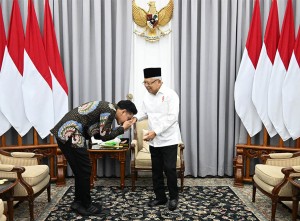JAKARTA: Approaching the yearend, the central bank (BI) releases a policy package consisting of 23 regulations aiming to strengthen monetary stability and anticipate economic volatility.
The regulatory package, called the December 2010 BI Policy Package, consists of five important priorities, namely strengthening monetary stability, improving intermediary role, boosting banking security, improving macro-prudential banking, and optimizing supervisory function. According to BI Governor Darmin Nasution, the increasingly dynamic global environment made the central bank enhance its policy response. He said the global economic recovery had not yet spread well, while the amount of capital inflow was huge. At the same time, Indonesia needed funds for its development, prompting the central bank to reallocate the foreign capital inflow to the real sector. "Savings in our economy are lower than investments needed to support the economy. Government revenues are lower than government spending, making capital inflow necessary," he told a pres conference yesterday. Therefore, he added, BI would improve the intermediary role and create access for the small people to financial services. To create monetary stability, BI imposes a limit on short-term banking foreign loan daily balance. At the same time, the central bank eliminates an obligation for domestic companies to provide foreign currency supplies. BI will improve the banking industry's intermediary role through six measures, such as publishing benchmark interest rates for retail, SMEs, and micro loans, regulating license-granting process, and regulating mortgage loan securitization. To boost the banking security, the central bank, among other, will revise the regulation on fit and proper test and tighten sales through bancassurance. In the meantime, to bolster macro-prudential banking, the central bank will revise the regulation on the use of information on banks' business plan, raise foreign currency reserves requirement to 5% in March and 8% in June, and recover the short-term financing facility regulation back to normal. Moreover, the central bank will perfect the risk-based supervisory system to improve the supervisory role. An economist at the Indonesian Economists Association (ISEI) Mirza Adityaswara disclosed the central bank's policy package was a positive thing to respond to the banking industry's need right not. "The policy of raising foreign currency reserves requirement is the central bank's response to reduce the liquidity excess coming from the huge amount of capital inflow. If the excess is not absorbed, the economy will be overheating." However, Vice President Director of Bank Panin Roosniati reminded the reserves requirement hike would increase cost of fund. "We will review the impacts." As to the policy of handling problematic banks, Mirza viewed it as the central bank's form of strictness. "The policy is important to maintain macro-economic stability and the national banking industry." A few days prior to the release of the package, Chief Economist at Bank Mandiri M. Doddy Ariefianto criticized that it was not the right momentum to relax Risk-Based Weighed Assets (ATMR) despite the fact the policy would be helpful top boost lending. "The problem is not the offer, but the small demand," he analyzed. An economist at Bank Danamon Anton Gunawan agreed, saying he could not understand why the central bank craved for more lending, while Indonesia's lending growth had been among the highest in Southeast Asia. "Our lending growth has hovered at 21%-22%, higher than single digit or lower double digit growths recorded by other Southeast Asian countries." In response to the tightened sales through bancassurance, Vice Chairperson of the General Insurances Association Julian Noor viewed the initiative limited marketing and changed the financial statement system. "However, we view the central bank only wants to protect the people." Head of Treasury at BCA Branko Windoe considered the new regulation on bancassurance positive, adding that he hoped the regulation could eliminate the gray area between banks and insurance companies. "We hope the new regulation will eradicate the gray area." (07/wiw)
Cek Berita dan Artikel yang lain di Google News dan WA Channel














